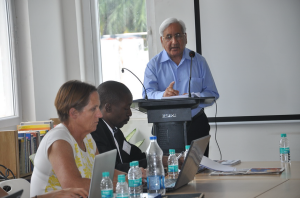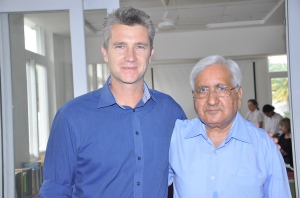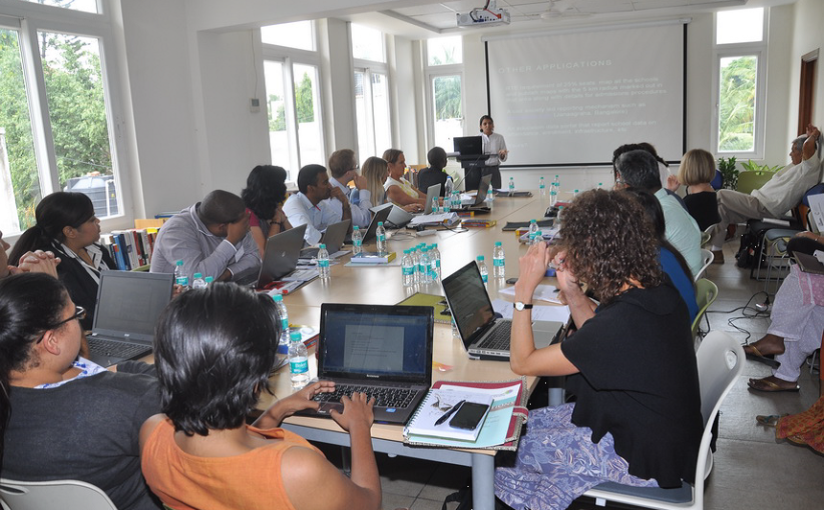The fundamental right to education must include quality education – and standardised measures of outcomes must be introduced to ensure equality, quality and accountability. The future development agenda should be committed to its enforceability. These were some of the conclusions following two days of thought-provoking presentations and discussions during a conference held last month.
The conference, “The Justiciability of the Right to Education in the post-2015 Development Agenda”, and was held on the 25 & 26 May 2015 in India, by the Legal Resources Centre (LRC), in collaboration with the Centre for Law and Policy Research (CLPR). See the CLPR to download the presentations.
The UN Special Rapporteur on the Right to Education, Dr Kishore Singh, opened proceedings by highlighting the fact that this right is justiciable in many countries, with India leading the way. In relation to the development agenda, Singh highlighted the fact that, for various reasons, the Millennium Development Goals (MDGs) have not been achieved as envisaged. Two of the principal reasons for this are a lack of financing and a lack of monitoring – issues that would need to be addressed in the post-2015 Sustainable Development Goals (SDGs).

Overview of presentations
Swati Sharma of Centurion University discussed the role of public-private partnership and corporate social responsibility in respect of education. She emphasised that, while state investment in education was a priority, the burden should be shared with the private sector, arguing that skills development was a key factor in achieving quality education and that businesses can play a key role in skills development and ensuring the right to education generally.
Professor Sandra Fredman of Oxford University gave a very informative overview of the right to education. She explored the relationship between development goals and human rights. She highlighted the fact that, as the MDGs focussed on enrolment, there was no measure of the quality of education. She noted that the SDGs are more ambitious and focus on “equitable quality education” and “lifelong learning for all”.
Professor Salomao Ximenes of the Sao Paulo Federal University informed participants of the education litigation which has taken place in Brazil. In particular, a recent case concerned the lack of pre-school places available in Sao Paulo. In 2012, the court ordered that a public hearing be convened to deal with the matter, and ordered that 150,000 pre-school places be made available, and that the municipality had six weeks in order to present a plan to the court setting out how this would be done.
Sarah Sephton, Cameron McConnachie and Jason Brickhill of the Legal Resources Centre provided details of the cases litigated in South Africa, and the remedies and enforcement mechanisms available through the courts. The strategy used has been to start with smaller cases, addressing issues such as furniture, then move onto larger and more complex cases. They have not yet tackled the issue of the quality of education, an area of litigation the LRC are hoping to embark on.
Jason Brickhill spoke about enforcement measures, such as the recent appointment of a “claims administrator” to oversee the correct payment of R82 million of teachers’ salaries. He ended on a positive note emphasising that the successes of the litigation so far.
Jayna Kothari, Aparna Ravi and Varsha Iyengar from CLPR began the second day of the conference by presenting on education litigation in India. The most important legislation passed in respect of education in India has been the Right to Education Act 2009, which provides for free and compulsory education for 6 – 14 year olds. Controversially, the Act contained a clause which stated that private schools must admit 25% of children from disadvantaged areas, for a fixed amount of compensation to be paid by the state. This has produced unintended consequences. Private schools challenged this through the courts, resulting in funded and un-funded minority schools being exempt. This has opened a floodgate of schools which claim they should be exempt as they are a “minority” school.
Kothari gave a presentation on remedies in India, explaining the challenges that have been met in designing remedies for education cases. Carefully worded remedies are necessary. However, the court has refused to grant orders and, instead, put in place a High Powered Committee to deliberate a plan for the right to education, to meet every month. On the one hand, this process creates a participatory process whereby stakeholders are able to be engaged with the enforcement of the RTE Act, and to design policy in relation to it. However, on the other hand, it has been very difficult to suggest accountability or monitoring measures to the government.

Niranjan Aradhya of the Centre for the Child and the Law in India gave an in-depth analysis of the rights and limitations as set down in the Right to Education Act 2009, explaining that, despite the Act, inequalities in the education system in India remain glaring. He made suggestions for the post-2015 development agenda; that 15% of GDP of states is spent on education, as well as checks on privatisation, commercialisation, corporatisation of education, and a re-emphasis on education as a social good.
Ramya Jawahar and Gowthaman Ranganathan of the Alternative Law Forum (ALF) spoke of the various methods employed by ALF to enforce socio-economic rights. They use an inter-disciplinary approach combining research and the law to achieve the greatest effect. They also highlighted the wider issue of the government’s tightening of funds in the non-profit sector, referring to recent cases whereby the accounts of Greenpeace, the Ford Foundation and Amnesty International had been frozen.
Avni Rastogi of Transparent Cities Network and the Community Service and Outreach team gave a detailed explanation of the mapping and data collection methods which can be used to collect accurate data to present to the court. The methods provide imaginative and reliable solutions which could support education litigation.
Conclusion
The conference concluded with a discussion of three principal themes which had emerged: i) the role of litigation, ii) the issue of equitable and quality education, and iii) education in relation to other issues. In relation to litigation, a principal concern is that litigation needs to change on the ground and engage with communities. In respect of quality education, a principal issue is that of monitoring and measuring outcomes. As an input method to achieve better outcomes, a suggestion was further teacher-training and improving the quality of teachers. Governments need to be held accountable if they are not attaining the goals set out in the post-2015 development agenda. Governments must invest more in education and regulate the private sector.
Dr Kishore Singh closed the conference with confirmation that he will ensure the issues discussed at the conference will be incorporated to discussions surrounding the post-2015 development agenda. It is clear that principal concerns are the measurability of quality education and accountability of governments. In terms of litigation, the countries represented at the conference have developed jurisprudence whereby the right to education is enforceable through the courts, and it is hoped that many more jurisdictions will follow suit.
Please see the CLPR website to download the presentations.
– By Shona Gazidis


I for one also believe that education is for everybody. Education is something that should be given to anyone and be acquired by anyone. In our modern age, there is a sickness that corrupts our mind into thinking that we always need money to have education. Well most schools really cost a lot and requires money for it, but that shouldn’t stop you from learning. Education is not 100% all about schools, colleges, or universities. Education is everywhere and it is the right of everyone. If you want to learn, you will just have to seek education yourself for you to able to learn.